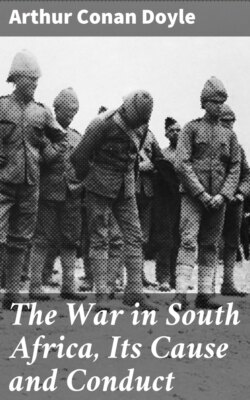The War in South Africa, Its Cause and Conduct

Реклама. ООО «ЛитРес», ИНН: 7719571260.
Оглавление
Arthur Conan Doyle. The War in South Africa, Its Cause and Conduct
The War in South Africa, Its Cause and Conduct
Table of Contents
PREFACE
THE WAR: ITS CAUSE AND CONDUCT
CHAPTER I
THE BOER PEOPLE
CHAPTER II
THE CAUSE OF QUARREL
CHAPTER III
THE NEGOTIATIONS
CHAPTER IV
SOME POINTS EXAMINED
CHAPTER V
THE NEGOTIATIONS FOR PEACE
CHAPTER VI
THE FARM-BURNING
CHAPTER VII
THE CONCENTRATION CAMPS
CHAPTER VIII
THE BRITISH SOLDIER IN SOUTH AFRICA
CHAPTER IX
FURTHER CHARGES AGAINST BRITISH TROOPS
Expansive and Explosive Bullets
Conduct to Prisoners on the Field
Executions
Hostages upon Railway Trains
CHAPTER X
THE OTHER SIDE OF THE QUESTION
CHAPTER XI
CONCLUSIONS
Отрывок из книги
Arthur Conan Doyle
Published by Good Press, 2019
.....
In the very year after the Sand River Convention, a second republic, the Orange Free State, was created by the deliberate withdrawal of Great Britain from the territory which she had for eight years occupied. The Eastern Question was already becoming acute, and the cloud of a great war was drifting up, visible to all men. British statesmen felt that their commitments were very heavy in every part of the world, and the South African annexations had always been a doubtful value and an undoubted trouble. Against the will of a large part of the inhabitants, whether a majority or not it is impossible to say, we withdrew our troops as amicably as the Romans withdrew from Britain, and the new republic was left with absolute and unfettered independence. On a petition being presented against the withdrawal, the Home Government actually voted 48,000l. to compensate those who had suffered from the change. Whatever historical grievance the Transvaal may have against Great Britain, we can at least, save perhaps in one matter, claim to have a very clear conscience concerning our dealings with the Orange Free State. Thus in 1852 and in 1854 were born those sturdy States who have been able for a time to hold at bay the united forces of the Empire.
In the meantime Cape Colony, in spite of these secessions, had prospered exceedingly, and her population—British, German, and Dutch—had grown by 1870 to over two hundred thousand souls, the Dutch still slightly predominating. According to the liberal colonial policy of Great Britain, the time had come to cut the cord and let the young nation conduct its own affairs. In 1872 complete self-government was given to it, the Governor, as the representative of the Queen, retaining a nominal unexercised veto upon legislation. According to this system the Dutch majority of the colony could, and did, put their own representatives into power and run the government upon Dutch lines. Already Dutch law had been restored, and Dutch put on the same footing as English as the official language of the country. The extreme liberality of such measures, and the uncompromising way in which they have been carried out, however distasteful the legislation might seem to English ideas, are among the chief reasons which made the illiberal treatment of British settlers in the Transvaal so keenly resented at the Cape. A Dutch Government was ruling the British in a British colony, at a moment when the Boers would not give an Englishman a vote upon a municipal council in a city which he had built himself.
.....